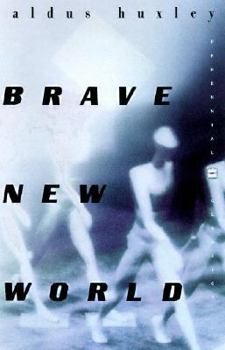As seems to happen each time I come to recounting a book I’ve read, I don’t like to do it very much because, I’m sorry to say, it requires me to think about it, comprehensively, and I think I’m so ‘of my time’ that thinking this way is uncomfortable.
It’s much easy to just read it and move on to the next book.
And this is what Brave New World is all about, so how fitting. No room to sit and think, just accept and let us take care of everything!
So, retain my mind and soul from The State I’ll do the recounting.
By the way, this is a reality I regret and also know that by recounting it anyways I will get better at thinking.
Thinking is like a sport in a way: you do it more and try harder and you get better at it.
My summary recollection of the book is this:
It’s most likely that a government, or phenomenon (but government in the lens of the book), is more successful at keeping you in line by satiating you and keeping you from thinking too hard about your circumstances or the way things are than they are successful through intimidation and bullying.
The Arab Spring hasn’t happened in modern China because, from my understanding, most people have access to a frictionless, convenient, and cheap life that they trade for a bit of spying here and authoritarianism there.
Egypt revolted in the Arab Spring because economic circumstances weren’t all that developed AND they were ruled by under a brutal regime.
So, I do think that Brave New World is sooner to happen (and may be happening) than 1984.
“Government’s an affair of sitting, not hitting. You rule with the brains and the buttocks, never the fists. For example, there was the conscription of consumption.” pg. 49
From here, I’ll mostly make notes of the pages where I wrote or underlined. I read the 1998 HarperPerennial Classic edition of the book, so page notes correspond to that copy.
- pg. 51
- pg. 52: “I love new clothes, I love new clothes, I love…”
- pg. 55: “Old men in the bad old days used to renounce, retire, take to religion, spend their time reading, thinking–thinking!”
- “Now–such is progress–the old men work, the old men copulate, the old men have no time, no leisure from pleasure, not a moment to sit down and think–or if every by some unlucky chance such a crevice of time should yawn in the solid substance of their distractions, there is always soma, delicious soma…”
- Under this I wrote “the algorithm!”
- pg. 67
- pg. 69 & 70 as one underline
- I remember reading this section and having a big reaction to it
- pg. 88
- pg. 91: “… what would it be like if I could, if I were free–not enslaved by my conditioning.”
- The state conditions
- Removes all friction from your life so you have no need to demand anything
- pg. 98
- pg. 130
- pg. 149
- pg. 177
- pg. 220: “But that’s the price we have to pay for stability. You’ve got to choose between happiness and what people used to call high art. We’ve sacrificed the high art. We have the feelies and the scent organ instead.”
- pg. 224
- pg. 227: “Happiness is a hard master–particularly other people’s happiness. A much harder master, if one isn’t conditioned to accept it unquestioningly, than truth.”
- pg. 228: “One can’t have something for nothing. Happiness has got to be paid for.”
- pg. 231: “God in the safe and Ford on the shelves.”
- pg. 232, 233, 234
- This whole story of the savage being observed by everyone in the lighthouse, and killing himself after giving in to the State, and then being commoditized for their entertainment was just brutal. and the whole reason the book is killer.
- pg. 236
- pg. 237-238: here I circle the whole last paragraph and made a note saying “The whole of the book. The warning to man.”
- “My dear young friend,” said Mustapha Mond, “civilization has absolutely no need of nobility or heroism. These things are symptoms of political inefficiency. In a properly organized society like ours, nobody has any opportunities for being noble or heroic. Conditions have got to be thoroughly unstable before the occasion can arise. Where there are wars, where there are divided allegiances, where there are temptations to be resisted, objects of love to be fought for or defended–there, obviously, nobility and heroism have some sense. But there are no wars nowadays. The greatest care is taken to prevent you from loving any one too much. There’s no such thing as a divided allegiance; you’re so conditioned that you can’t help doing what you ought to do. And what you ought to do is on the whole so pleasant, so many of the natural impulses are allowed free play, that there are really aren’t any temptations to resist. And if ever, by some unlucky chance, anything unpleasant should somehow happen, why, there’s always soma to give you a holiday from the facts. And there’s always soma to calm your anger, to reconcile you to your enemies, to make you patient and long-suffering. In the past you could only accomplish these things by making a great effort and after years of hard moral training. Now, you swallow two or three half-gramme tablets, and there you are. Anybody can be virtuous now. You can carry at least half your mortality about in a bottle. Christianity without tears–that’s what soma is.”
- pg. 240
- “But I like the inconveniences.”
“We don’t,” said the Controller. “We prefer to do things comfortably.”
“but I don’t want comfort. I want God, I want poetry, I want real danger, I want freedom, I want goodness. I want sin.”
- “But I like the inconveniences.”
Very important book.
